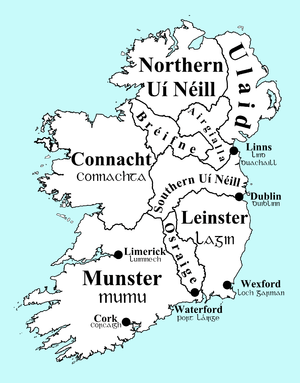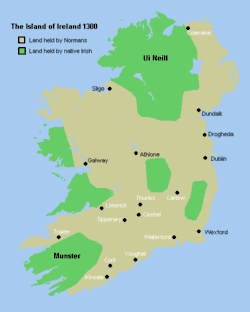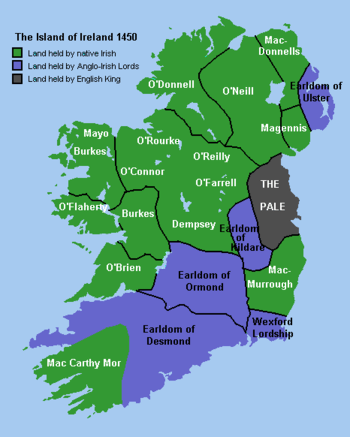List of Irish kingdoms
This article lists some of the attested Gaelic kingdoms of Early Medieval Ireland prior to the Norman invasion of 1169-72.




For much of this period, the island was divided into numerous clan territories and kingdoms (known as túatha). These túatha often competed for control of resources and thus they continually grew and shrank (in both size and number). In addition to kingdoms or túatha, Gaelic Ireland was also divided into five prime overkingdoms (Old Irish cóiceda, Modern Irish cúige). These were Ulaid (in the north), Connacht (in the west), Laighin (in the southeast), Mumhan (in the south) and Mide (in the centre).
After the Norman invasion, much of the island came under the control of the Lordship of Ireland, although some parts remained under the control of Gaelic dynasties. After 1350, Norman control began to weaken, and a "Gaelic resurgence" took place which resulted in the direct influence of the Parliament of Ireland shrinking to an area known as The Pale by 1500. In 1541 the Kingdom of Ireland was established by Henry VIII and the Tudor conquest of Ireland commenced. The repudiation of the terms of the Treaty of Mellifont by the Crown resulted in the Nine Years War and Flight of the Earls, which marked the end of the Gaelic order.
Ulster
Earliest times
- Darini, in Tyrone, Armagh and Down, possibly a branch of the Érainn and linked with their supposed ancestor deity Dáire
- Erdini in County Fermanagh
- Robogdii, in Antrim and Londonderry, possibly related to the later Dál Riata
- Venicnii in County Donegal
- Voluntii, probably the people later known as the Ulaid, in Armagh, Down, Monaghan and Cavan
Early Christian
- Airgíalla or Oirghialla or Oriel
- Airthir
- Cairpre Droma Cliab
- Cenél Conaill (Tir Chonaill)
- Cenél nEogain (Tir Eogain)
- Conaille Muirtheimne
- Cruithne
- Dál nAraidi
- Dál Fiatach
- Dál Riata
- Dartraige
- Dartraige Con-innsi
- Eilne
- Uí Echach Cobo
- Northern Uí Néill
- Ulaid
From 12th Century
Meath
Early Christian
Leinster
Earliest times
Early Christian
From 12th Century
- Kingdom of Leinster, see also Kings of Leinster.
Munster
Earliest times
- Gangani or Concani in Counties Limerick and Clare; also lived in Wales - Ptolemy calls the Llŷn Peninsula the "Promontory of the Gangani"
- Iverni in County Cork, later known as the Érainn
- Luceni in Counties Kerry and Limerick
- Usdiae, Udiae or Vodiae in Counties Waterford and Cork, possibly related to the later Osraige
- Uterni in Cork
- Vellabori or Velabri in Kerry
Early Christian
From the 12th century
Connacht
Earliest times
- Auteini in County Galway, identified with the later Uaithne
- Nagnatae in County Mayo and County Sligo, possibly linked with the Ol nÉcmacht; Cóiced Ol nEchmacht was an ancient name for Connacht.
Early Christian
- Aidhne or Uí Fiachrach Aidhne
- Breifne
- Conmaicne Mara
- Connachta
- Corco Moga
- Delbhna
- Delbhna Nuadat
- Delbhna Tir Dha Locha
- Fir Domnann (aka Irrus Domnann)
- Hy Briuin Ai
- Hy Diarmata
- Hy Fiachrach Aidhne
- Hy Fiachrach Fionn
- Hy Fiachrach Muaidhe
- Hy-Many
- Kinela
- Moylurg
- Muintir Murchada
- Partraige
- Síol Anmchadha
- Síol Muirdeach
- Tír Soghain
- Uí Fiachrach
From 12th Century
See also
- Irish nobility
- List of Irish tribes/clans
- MacDunleavy (dynasty)
- Monarchy of Ireland
- O'Donnell dynasty
References
- Bhreathnach, Edel (ed.), The Kingship and Landscape of Tara. Four Courts Press for The Discovery Programme. 2005.
- Byrne, Francis J., Irish Kings and High-Kings. Four Courts Press. 3rd edition, 2001.
- Charles-Edwards, T.M., Early Christian Ireland. Cambridge University Press. 2000.
- Curley, Walter J.P., Vanishing Kingdoms: The Irish Chiefs and their Families. Dublin: Lilliput Press. 2004.
- Dillon, Myles, The Cycles of the Kings. Oxford. 1946. / Four Courts Press. Revised edition, 1995.
- Duffy, Seán (ed.), Medieval Ireland: An Encyclopedia. Routledge. 2005.
- Keating, Geoffrey, with David Comyn and Patrick S. Dinneen (trans.), The History of Ireland by Geoffrey Keating. 4 Vols. London: David Nutt for the Irish Texts Society. 1902-14.
- MacKillop, James, A Dictionary of Celtic Mythology. Oxford. 1998.
- Koch, John T. (ed.), Celtic Culture: A Historical Encyclopedia. 5 volumes or single ebook. ABC-CLIO. 2006.
- Lalor, Brian, The Encyclopedia of Ireland. Yale University Press. 2003.
- Mac Niocaill, Gearóid, Ireland before the Vikings. Dublin: Gill and Macmillan. 1972.
- Meyer, Kuno (ed.), "The Laud Genealogies and Tribal Histories", in Zeitschrift für Celtische Philologie 8. Halle/Saale, Max Niemeyer. 1912. Pages 291-338.
- Ó Corráin, Donnchadh (ed.), Genealogies from Rawlinson B 502 University College, Cork: Corpus of Electronic Texts. 1997.
- Ó Corráin, Donnchadh, Ireland before the Normans. Dublin: Gill and Macmillan. 1972.
- O'Donovan, John (ed. and tr.), Annála Ríoghachta Éireann. Annals of the Kingdom of Ireland by the Four Masters, from the Earliest Period to the Year 1616. 7 vols. Royal Irish Academy. Dublin. 1848-51. 2nd edition, 1856.
- O'Rahilly, Thomas F., Early Irish History and Mythology. Dublin Institute for Advanced Studies. 1946.
- Rynne, Etienne (ed.), North Munster Studies: Essays in Commemoration of Monsignor Michael Moloney. Limerick. 1967.
- Sproule, David, "Origins of the Éoganachta", in Ériu 35 (1984): pp. 31–37.